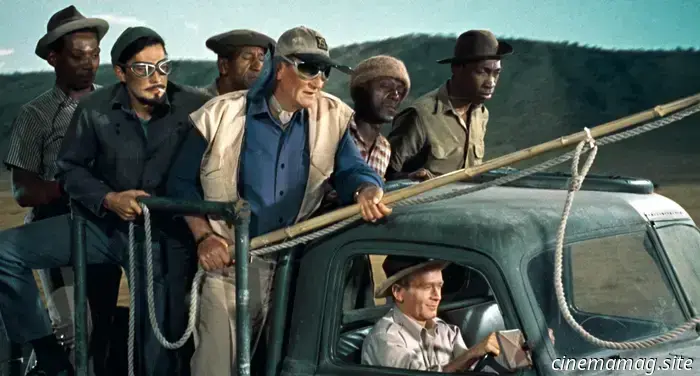
Cannes Review: Leave One Day is a Musical Filled with Nostalgia That Takes a Conservative Approach
Frequent festival attendees learn to temper their expectations for opening films. Quality is merely one of several factors influencing the choice for this prominent position. To avoid offending sensitivities and setting a contentious tone for the festival right from the start, programmers often select something more conventional or less daring as their opener. Even with lowered expectations, French director Amélie Bonnin’s comic-dramatic musical Leave One Day, which kicked off the 78th Cannes Film Festival, proves to be a disappointing experience. While it’s clear that this charming, nostalgic homage to rural life is well-intentioned, its message suffers from a lack of depth and willingness to take creative risks.
Expanded from Bonnin’s award-winning 25-minute short of the same title, the film follows Cécile (Juliette Armanet), who left her country home for Paris to pursue a culinary career. When her father experiences a medical crisis, she returns to her hometown, where old tensions resurface. On one side, the locals admire her accomplishments; she won a cooking competition on TV and is preparing to open a restaurant in Paris. On the other side, there’s a hint of jealousy or resentment in the way they congratulate her. Her father, for instance, meticulously keeps a notebook of her comments from the cooking show, often reminding her of the derogatory way she spoke of her upbringing. Additionally, there's Raphaël (Bastien Bouillon), her high school sweetheart, who still harbors unresolved feelings for her.
From this brief overview, it’s easy to surmise that A) the film honors those who feel overlooked and judged by the more affluent city dwellers; and B) the protagonist will find herself in a romantic triangle involving her charming first love. While both scenarios have potential, Leave One Day unfolds with such predictable familiarity that it’s difficult to feel enthusiasm for its themes. Occasionally, the film offers insightful moments, such as when Raphaël and his middle-aged friends seem caught in a time loop, leading lives they've always led and are likely to continue. However, it largely adheres to a storyline we’ve encountered too often, culminating in the predictable conclusion where the sophisticated chef collaborates with her proudly provincial father on a dessert that merges both their worlds.
This safe, non-offensive storytelling aims to appeal to a wide audience, but it lacks the courage to explore uncomfortable themes or confront harsh realities, preventing it from resonating deeply with its viewers. Furthermore, the portrayal of rural characters as a uniform group of hearty, hardworking individuals driven by an unwavering joie de vivre is charming yet stereotypical and somewhat condescending, likely not the filmmaker's intention.
The rekindled romance between Cécile and Raphaël, which evokes fond memories of simpler times, is not the only element invoking nostalgia in Leave One Day. The film includes musical sequences featuring pop hits from the ’90s and ’00s. While some songs serve a more significant role and evoke emotional responses, most fall flat. Hearing renditions of “Alors on danse” or classic Celine Dion is enjoyable, yet Bonnin doesn’t integrate the songs into the narrative meaningfully. Frequently, characters burst into song mid-conversation without appropriate context, making it feel forced and awkward. Their brief musical interludes, covering only a verse or two, amplify the awkwardness of their inclusion. An exception is the finale, “Partir un jour,” from which the film derives its original title. Sung by Armanet as her character departs yet again, this upbeat song is transformed into a poignant ballad that beautifully captures Cécile’s inner turmoil.
Aside from a poignant conclusion featuring decisions and farewells, a scene at the skating rink stands out for its inventive concept and lively execution. With clever design, the two protagonists revisit the moment before Cécile left for Paris, reconnecting with their teenage friends from 2001 as they relive a song that should have led to their first kiss. The set design, editing, and choreography come together to create a joyful moment that highlights Bonnin's talent for stage direction.
Despite these fleeting highlights, Leave One Day is a well-meaning, carefully acted feature debut that ultimately fails to impress. Supporters may point to the film's critique of elitism as a reason for the critique it receives, but regardless of one's political stance, it shouldn't be controversial to expect art to pursue truth; that's what fosters empathy and gives any film its effectiveness.
Leave One Day premiered at the 2025 Cannes Film Festival.
Other articles
 The Speedball trailer highlights the newly introduced League Mode.
Rebellion has launched a significant update for the revival of the Bitmap Brothers' futuristic sports franchise, Speedball. This recent update introduces League Mode to the game, along with new arena hazards, fresh tackles, and two new arenas named Grand Central and King’s Terminus. Check out the new trailer below to see these additions. The […]
The Speedball trailer highlights the newly introduced League Mode.
Rebellion has launched a significant update for the revival of the Bitmap Brothers' futuristic sports franchise, Speedball. This recent update introduces League Mode to the game, along with new arena hazards, fresh tackles, and two new arenas named Grand Central and King’s Terminus. Check out the new trailer below to see these additions. The […]

 Trailer for the action thriller set during the Civil War, titled Resurrection Road.
Saban Films has released a poster and trailer for the Civil War-era action thriller Resurrection Road, written and directed by Ashley Cahill. The film follows Barabbas, a former slave, who leads a specialized team of soldiers tasked with infiltrating a Confederate fort to destroy its arsenal. However, their mission takes a dark turn when they discover a malevolent […]
Trailer for the action thriller set during the Civil War, titled Resurrection Road.
Saban Films has released a poster and trailer for the Civil War-era action thriller Resurrection Road, written and directed by Ashley Cahill. The film follows Barabbas, a former slave, who leads a specialized team of soldiers tasked with infiltrating a Confederate fort to destroy its arsenal. However, their mission takes a dark turn when they discover a malevolent […]
 The Film Stage showcases an IB Technicolor print of Howard Hawks' Hatari! at the Roxy Cinema.
After achieving success with Howard Hawks' Rio Bravo and an IB Technicolor version of Marlon Brando's One-Eyed Jacks, it made sense to find a middle ground. In partnership with the Roxy Cinema, The Film Stage is excited to showcase Hawks' safari classic Hatari! in IB Technicolor on Friday, May 30, and Sunday, June 1. Tickets available now.
The Film Stage showcases an IB Technicolor print of Howard Hawks' Hatari! at the Roxy Cinema.
After achieving success with Howard Hawks' Rio Bravo and an IB Technicolor version of Marlon Brando's One-Eyed Jacks, it made sense to find a middle ground. In partnership with the Roxy Cinema, The Film Stage is excited to showcase Hawks' safari classic Hatari! in IB Technicolor on Friday, May 30, and Sunday, June 1. Tickets available now.
 Krysten Ritter's Jessica Jones is slated to return to the MCU in the second season of Daredevil: Born Again.
The Netflix Daredevil era has remained present, and now all the components are reassembling for the upcoming Disney+ series. Following the introduction of the universe with Daredevil: Born Again, an essential element has returned in the shape of Jessica Jones. It was announced during the Disney upfront presentation that […]
Krysten Ritter's Jessica Jones is slated to return to the MCU in the second season of Daredevil: Born Again.
The Netflix Daredevil era has remained present, and now all the components are reassembling for the upcoming Disney+ series. Following the introduction of the universe with Daredevil: Born Again, an essential element has returned in the shape of Jessica Jones. It was announced during the Disney upfront presentation that […]
 Jude Law and Andrew Garfield will portray Siegfried and Roy in a series for Apple TV+.
If you were raised before the 2000s, you couldn't avoid hearing about Siegfried & Roy. Now, their captivating story filled with wild tigers is set to be adapted. Variety has reported that an Apple TV+ limited series is underway, featuring Jude Law and Andrew Garfield in lead roles. Law will portray Siegfried, while Garfield will take on the role of […]
Jude Law and Andrew Garfield will portray Siegfried and Roy in a series for Apple TV+.
If you were raised before the 2000s, you couldn't avoid hearing about Siegfried & Roy. Now, their captivating story filled with wild tigers is set to be adapted. Variety has reported that an Apple TV+ limited series is underway, featuring Jude Law and Andrew Garfield in lead roles. Law will portray Siegfried, while Garfield will take on the role of […]
Cannes Review: Leave One Day is a Musical Filled with Nostalgia That Takes a Conservative Approach
Regular attendees of festivals come to understand that opening films often don't meet high expectations. The quality of these films is just one of several considerations that influence their selection for this prominent position. To prevent upsetting audiences and creating a contentious atmosphere from the start, festival organizers usually opt for something that is less daring or provocative for their opening slot.
